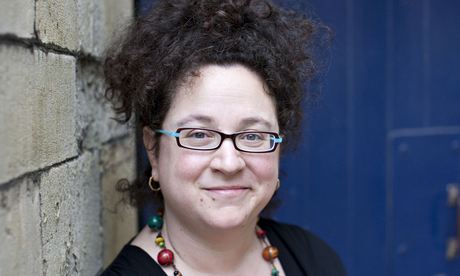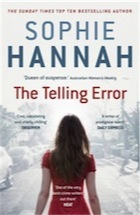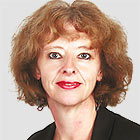The crime writer and poet on contrasting literary disciplines, the poetry of sex and the genius of Agatha Christie

Sophie Hannah: 'Writing is like a whole other world in which I can make what I want to happen, happen.' Photograph: David Hartley/Rex Features
Sophie Hannah's talents are unusual: she is a bestselling crime writer (author of nine novels) and prize-winning poet (her fifth collection, Pessimism for Beginners, was shortlisted for the TS Eliot award). Her poetry is studied by GCSE, A-level and university students. And all her writing is characterised by a zestful intelligence. Her new crime novel The Telling Error explores the psychology of an erring middle-class mother without diluting a bold plot about the stabbing of a newspaper columnist. It is a novel in which hi-tech and low behaviour collide. She has also just edited The Poetry of Sex for Penguin – the sort of idea that, in the wrong hands, could be a fiasco; with Hannah at the helm, it's a triumph.
How far apart are crime writing and poetry?
 I have been interested in both equally all my life. All through childhood I wrote verses and mysteries. There is, for me, one connection: structure. My poetry is metrical, rhyming. My crime novels are highly structured. I never start out with a dead body. I start with an impossible scenario. Opening questions should be mysterious, weird, intriguing and contain the seeds of the solution. The structure has to be meticulous – I'm a structure freak.
I have been interested in both equally all my life. All through childhood I wrote verses and mysteries. There is, for me, one connection: structure. My poetry is metrical, rhyming. My crime novels are highly structured. I never start out with a dead body. I start with an impossible scenario. Opening questions should be mysterious, weird, intriguing and contain the seeds of the solution. The structure has to be meticulous – I'm a structure freak.
When and how did you become a crime writer?
I had the idea for my first crime novel, Little Face, in 2002, the day after my first baby, Phoebe, was born. When she was six months, we went to Crete where I wrote the synopsis: a woman goes out leaving her baby with her husband. On her return, there is a baby in the house and it is wearing her daughter's babygro, but it is not her baby.
More
 I have been interested in both equally all my life. All through childhood I wrote verses and mysteries. There is, for me, one connection: structure. My poetry is metrical, rhyming. My crime novels are highly structured. I never start out with a dead body. I start with an impossible scenario. Opening questions should be mysterious, weird, intriguing and contain the seeds of the solution. The structure has to be meticulous – I'm a structure freak.
I have been interested in both equally all my life. All through childhood I wrote verses and mysteries. There is, for me, one connection: structure. My poetry is metrical, rhyming. My crime novels are highly structured. I never start out with a dead body. I start with an impossible scenario. Opening questions should be mysterious, weird, intriguing and contain the seeds of the solution. The structure has to be meticulous – I'm a structure freak.When and how did you become a crime writer?
I had the idea for my first crime novel, Little Face, in 2002, the day after my first baby, Phoebe, was born. When she was six months, we went to Crete where I wrote the synopsis: a woman goes out leaving her baby with her husband. On her return, there is a baby in the house and it is wearing her daughter's babygro, but it is not her baby.
More

No comments:
Post a Comment